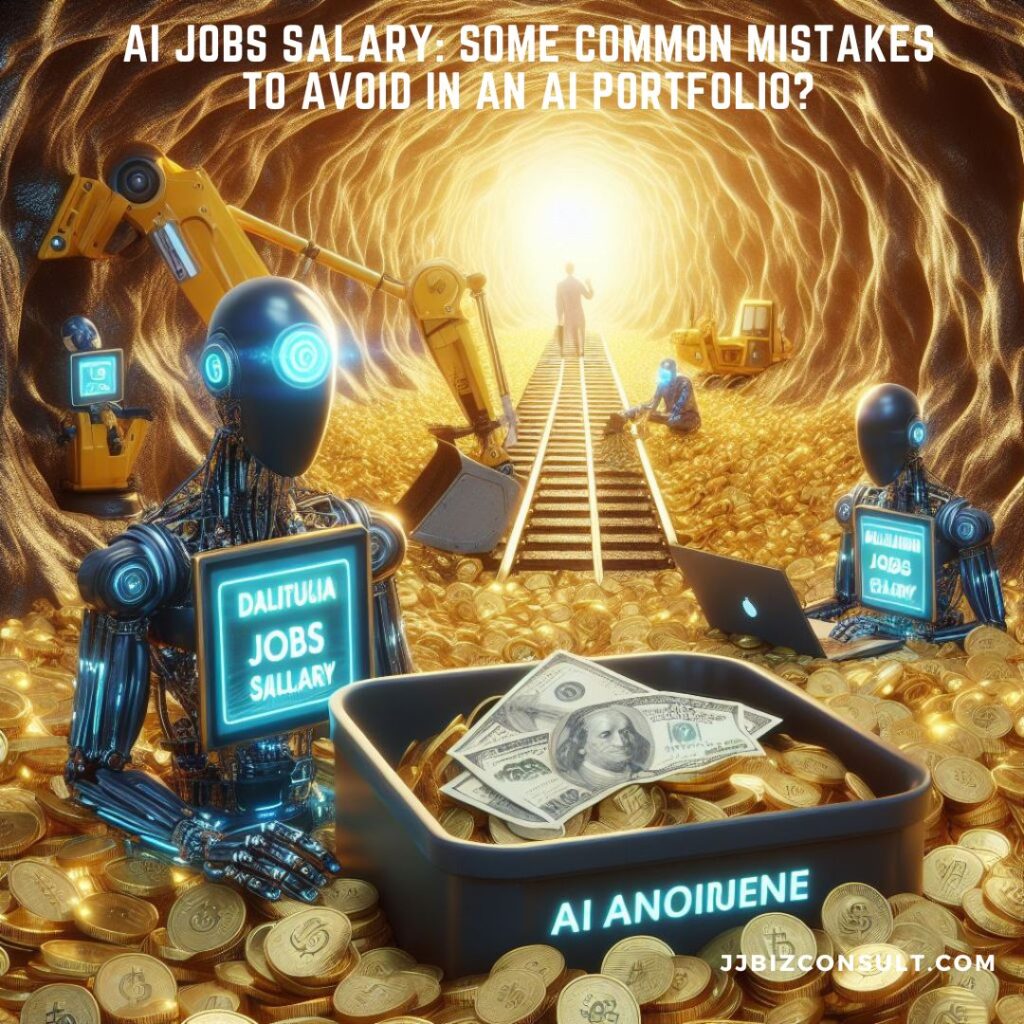AI Jobs Salary: Gold Mine in the Age of AI

AI Jobs Salary: The world of Artificial Intelligence (AI) is booming, and with it, a gold rush for skilled professionals. AI jobs offer some of the most competitive salaries in the tech industry, with top talent commanding eye-watering figures upwards of $1 million. But what does it take to land those dream jobs?
This blog post dives into the fascinating world of AI salaries, exploring the current talent landscape and equipping aspiring AI professionals with the tools they need to succeed.
While the tech industry is experiencing layoffs, there’s a fascinating twist: certain tech jobs are commanding salaries of up to $1 million. Let’s delve into this intriguing phenomenon:
- Tech Leadership Roles: Executives and leaders in technology companies often receive substantial compensation packages. Chief Technology Officers (CTOs), Chief Information Officers (CIOs), and other high-level tech executives can earn significant salaries, especially in large corporations or successful startups.
- Specialized AI and Machine Learning Roles: As the demand for AI and machine learning expertise grows, professionals with specialized skills in these areas are highly sought after. Roles such as AI researchers, machine learning architects, and data scientists can command impressive paychecks due to their scarcity and the critical role they play in shaping the future of technology.
- Quantitative Finance and High-Frequency Trading: In the financial sector, quantitative analysts (quants) and experts in high-frequency trading algorithms are known to earn substantial salaries. Their ability to analyze complex data and develop sophisticated trading strategies is invaluable to hedge funds and investment banks.
- Blockchain and Cryptocurrency: The rise of blockchain technology and cryptocurrencies has led to a surge in demand for blockchain developers, security experts, and consultants. These roles involve cutting-edge technology and can offer lucrative compensation.
- Cybersecurity Specialists: With the increasing frequency of cyber threats and data breaches, cybersecurity professionals are in high demand. Chief Information Security Officers (CISOs), ethical hackers, and security architects often receive competitive salaries due to the critical nature of their work.
- Top-Level Software Engineers: Exceptional software engineers with expertise in specific programming languages, frameworks, or domains can negotiate impressive compensation. Companies recognize that top-tier engineers drive innovation and product development.
- Tech Consulting and Advisory Services: Experienced consultants who provide strategic guidance to businesses on technology adoption, digital transformation, and process optimization can earn substantial fees. Their insights and recommendations directly impact organizational success.
- Patent Holders and Innovators: Individuals who hold patents for groundbreaking technologies or have made significant contributions to the tech industry can negotiate substantial compensation. Their intellectual property adds value to companies and drives innovation.
Remember that these high-paying roles are often reserved for seasoned professionals with exceptional skills, extensive experience, and a track record of success. Additionally, factors such as company size, location, and industry play a significant role in determining compensation. The war for talent continues, and companies are willing to invest significantly to secure the right recruits who can drive their success in the age of technology! 🌟
AI Jobs Salary: Other AI centric positions
- AI Engineer: The average base pay for an AI engineer is $127,986 per year.
- AI Researcher: AI researchers earn an average of $108,932 annually.
- Machine Learning Engineer: The average base pay for a machine learning engineer is $126,397 per year.
- Robotics Engineer: Robotics engineers receive an average base pay of $96,013 annually.
- Software Engineer: Software engineers specializing in AI earn around $118,761 per year.
- Data Scientist: Data scientists, a crucial role in AI, have an average base pay of $129,640 annually.
Keep in mind that these figures can vary based on factors such as your prior work experience and geographic location. Additionally, the demand for AI professionals is expected to grow significantly, with the global market size for AI projected to reach nearly two trillion dollars by 2030 . So, if you’re considering a career in AI, it’s a promising field with exciting opportunities! 🌟
The AI Talent Crunch: Why It Pays to Be an AI Expert
While some tech giants face layoffs, the demand for AI specialists is skyrocketing. This paradox stems from the transformative power of AI. From self-driving cars to medical diagnosis, AI is revolutionizing industries, and companies are scrambling for the talent to make it happen.
The result? A fierce competition for skilled AI professionals. Companies are luring top talent with staggering salaries, signing bonuses, and accelerated stock options.
AI Jobs Salary: How do you join this gold rush?

Master the Fundamentals: Building a Strong Foundation
A successful AI career starts with a solid foundation in mathematics, statistics, and programming languages. Linear algebra, calculus, and probability theory form the bedrock of AI algorithms. Statistical methods and data analysis are crucial for interpreting AI results.
Python reigns supreme as the language of AI, and familiarity with libraries like NumPy, pandas, and scikit-learn is a must. To delve deeper into deep learning, TensorFlow and PyTorch are the go-to frameworks.
Learning Never Stops: Sharpening Your Skills
The world of AI is constantly evolving. To stay ahead of the curve, continuous learning is paramount. Online courses on platforms like Coursera and edX, or Andrew Ng’s foundational “Machine Learning” course, are excellent starting points. Kaggle competitions provide hands-on experience tackling real-world problems with diverse datasets.
Building a Portfolio: Putting Your Skills into Action
Don’t just learn, do! Implement machine learning models, create chatbots, or build recommendation systems to solidify your practical skills. Showcase your projects on GitHub to demonstrate your capabilities and potentially collaborate on open-source projects.
Stay Curious: Keeping Your Finger on the Pulse of AI
Never stop exploring the frontiers of AI. Explore cutting-edge research papers on platforms like ArXiv to stay abreast of the latest advancements. Follow AI blogs, attend conferences like NeurIPS and ICML, and engage with the AI community to stay informed and inspired.
Collaboration is Key: Building Your Network
Building strong connections is invaluable in the tech industry. Attend local meetups and conferences to network with other AI professionals. Collaborate on group projects to hone your communication and teamwork skills, essential qualities for success in any AI role.
Specialize for Success: Choosing Your Niche
As you gain experience, consider specializing in a particular area of AI, like computer vision, natural language processing, or reinforcement learning. Deepen your knowledge by exploring advanced topics like generative adversarial networks (GANs), transformers, and unsupervised learning.
Beyond Tech Skills: The Power of Soft Skills
AI isn’t just about algorithms. The ability to explain complex concepts clearly and collaborate effectively with non-technical stakeholders is paramount. Critical thinking, problem-solving, creativity, and adaptability are essential for success in the dynamic world of AI.
Stay Ethical: The Responsibility of AI Power
As AI continues to shape our world, understanding the ethical implications is crucial. Strive for fairness, transparency, and respect for user privacy and data security in your work.
AI Jobs Salary: The AI Gold Rush Awaits

The lucrative world of AI jobs is within your reach. By equipping yourself with the necessary knowledge, skills, and a passion for innovation, you can embark on a fulfilling and rewarding career in this exciting field. Remember, the AI gold rush isn’t just about chasing a million-dollar paycheck; it’s about being at the forefront of technological progress and shaping the future with the power of AI.
AI Jobs Salary: How can I build a strong portfolio as an aspiring AI professional?
Building a robust portfolio is crucial for aspiring AI professionals. Here are some strategies to create an impressive AI portfolio that captures the attention of potential employers:
- Define Your Focus and Goals:
- Start by identifying your specific interests within AI. Whether it’s computer vision, natural language processing, recommendation systems, or another subfield, clarify your focus.
- Set clear goals for your portfolio. Showcase your expertise in a particular technique, demonstrate problem-solving abilities, or highlight versatility across multiple AI domains.
- Select Diverse Projects:
- Choose a variety of AI projects that demonstrate your skills and problem-solving capabilities.
- Include projects covering different techniques, datasets, and applications. For instance, consider projects related to image classification, sentiment analysis, fraud detection, or generative models.
- Show the Full Project Lifecycle:
- Highlight your ability to handle the entire project lifecycle:
- Data collection and preprocessing
- Exploratory data analysis
- Model selection and development
- Model evaluation
- Deployment
- Each project should provide insight into your end-to-end problem-solving skills.
- Highlight your ability to handle the entire project lifecycle:
- Provide Clear Documentation:
- Accompany each project with concise documentation.
- Explain the problem statement, project goals, methodologies used, and key results achieved.
- Include visualizations, code snippets, and relevant artifacts for easy understanding.
- Emphasize Impact and Results:
- Quantify the impact of your projects whenever possible. Highlight accuracy improvements, cost savings, or efficiency gains.
- Use data-driven metrics and compelling storytelling to showcase the value you’ve delivered.
- Collaborate on Open Source Projects:
- Contribute to open source projects and share your contributions in your portfolio.
- Active involvement in the open source community demonstrates collaboration skills, teamwork, and dedication to continuous learning.
- Include Supporting Materials:
- Showcase any additional materials related to your projects:
- Blog posts
- Presentations
- Code repositories (e.g., GitHub)
- Showcase any additional materials related to your projects:
Remember, your AI portfolio is a reflection of your practical experience, creativity, and ability to solve real-world problems. Craft it thoughtfully, and you’ll stand out in this competitive field! 🚀🤖
AI Jobs Salary: Some Common Mistakes to Avoid in an AI Portfolio?

When building your artificial intelligence (AI) portfolio, it’s essential to avoid common pitfalls that could undermine its impact. Let’s explore some mistakes to steer clear of:
- Lack of Originality:
- Mistake: Including projects or code snippets created by others.
- Solution: Ensure that the projects in your portfolio are genuinely yours. Showcase your unique contributions and problem-solving abilities.
- Generic Projects:
- Mistake: Focusing on run-of-the-mill projects like spam detection, housing price prediction, or iris flower classification.
- Solution: Aim for projects that demonstrate creativity, complexity, and real-world relevance. Choose topics that stand out and challenge your skills.
- Insufficient Documentation:
- Mistake: Providing projects without clear explanations or documentation.
- Solution: Accompany each project with concise documentation. Explain the problem, methodology, and results. Visualize your process and insights.
- Neglecting Market Research:
- Mistake: Failing to understand your target audience and industry trends.
- Solution: Research the AI job market, identify sought-after skills, and tailor your portfolio accordingly. Understand what employers are looking for.
- Ignoring Legal and Regulatory Compliance:
- Mistake: Neglecting legal aspects related to data privacy, intellectual property, and ethical considerations.
- Solution: Address legal and compliance issues transparently. Show that you understand the ethical implications of AI.
- Overlooking Soft Skills:
- Mistake: Focusing solely on technical prowess.
- Solution: Highlight communication skills, teamwork, and adaptability. Employers value AI professionals who can collaborate effectively and explain complex concepts.
- Not Demonstrating End-to-End Skills:
- Mistake: Only showcasing model development without covering the entire project lifecycle.
- Solution: Include data collection, preprocessing, exploratory analysis, model selection, evaluation, and deployment. Show that you can handle the full process.
Remember, your AI portfolio is your professional showcase. Make it compelling, authentic, and reflective of your expertise! 🚀🤖
Humane AI Pin: A Groundbreaking Wearable AI Device





